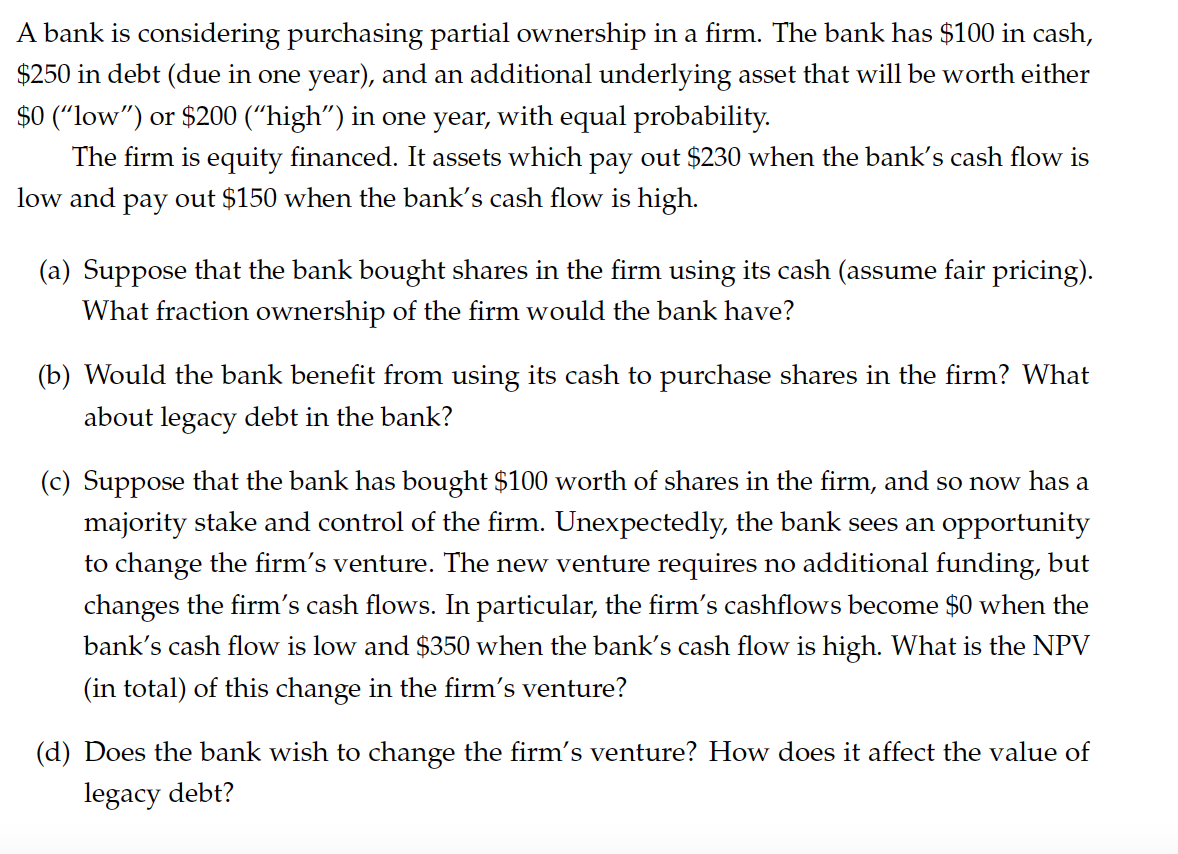

A bank is considering purchasing partial ownership in a firm. The bank has $100 in cash, $250 in debt (due in one year), and an additional underlying asset that will be worth either $0 (low) or $200 (high) in one year, with equal probability. The firm is equity financed. It assets which pay out $230 when the bank's cash flow is low and pay out $150 when the bank's cash flow is high. (a) Suppose that the bank bought shares in the firm using its cash (assume fair pricing). What fraction ownership of the firm would the bank have? (b) Would the bank benefit from using its cash to purchase shares in the firm? What about legacy debt in the bank? (c) Suppose that the bank has bought $100 worth of shares in the firm, and so now has a majority stake and control of the firm. Unexpectedly, the bank sees an opportunity to change the firm's venture. The new venture requires no additional funding, but changes the firm's cash flows. In particular, the firm's cashflows become $0 when the bank's cash flow is low and $350 when the bank's cash flow is high. What is the NPV (in total) of this change in the firm's venture? (d) Does the bank wish to change the firm's venture? How does it affect the value of legacy debt? (e) Are the other equity owners in the firm made better or worse off by the change in venture? (f) Explain why the change in firm venture makes the bank equity holders better off and the firm equity holders worse off. A bank is considering purchasing partial ownership in a firm. The bank has $100 in cash, $250 in debt (due in one year), and an additional underlying asset that will be worth either $0 (low) or $200 (high) in one year, with equal probability. The firm is equity financed. It assets which pay out $230 when the bank's cash flow is low and pay out $150 when the bank's cash flow is high. (a) Suppose that the bank bought shares in the firm using its cash (assume fair pricing). What fraction ownership of the firm would the bank have? (b) Would the bank benefit from using its cash to purchase shares in the firm? What about legacy debt in the bank? (c) Suppose that the bank has bought $100 worth of shares in the firm, and so now has a majority stake and control of the firm. Unexpectedly, the bank sees an opportunity to change the firm's venture. The new venture requires no additional funding, but changes the firm's cash flows. In particular, the firm's cashflows become $0 when the bank's cash flow is low and $350 when the bank's cash flow is high. What is the NPV (in total) of this change in the firm's venture? (d) Does the bank wish to change the firm's venture? How does it affect the value of legacy debt? (e) Are the other equity owners in the firm made better or worse off by the change in venture? (f) Explain why the change in firm venture makes the bank equity holders better off and the firm equity holders worse off








